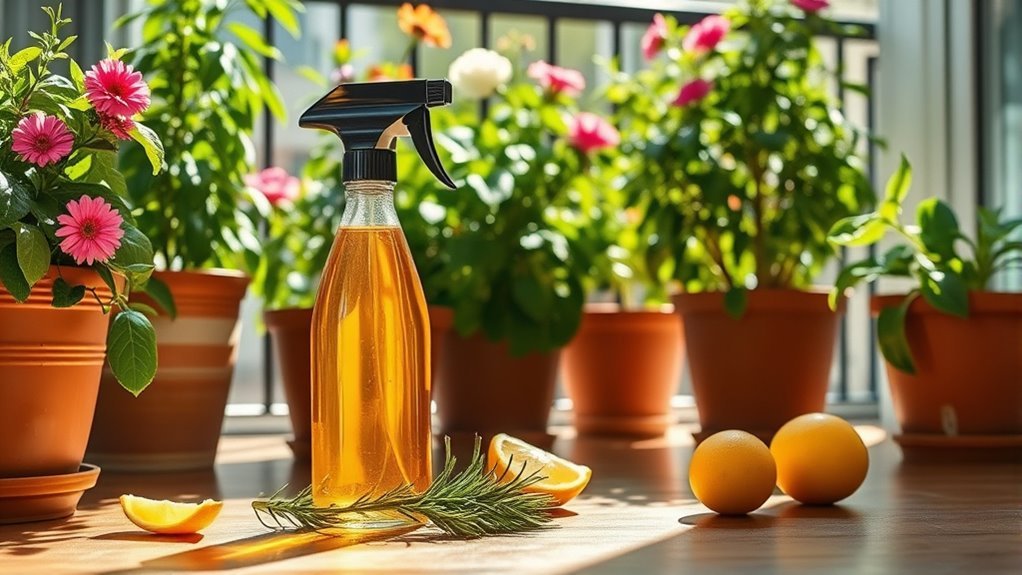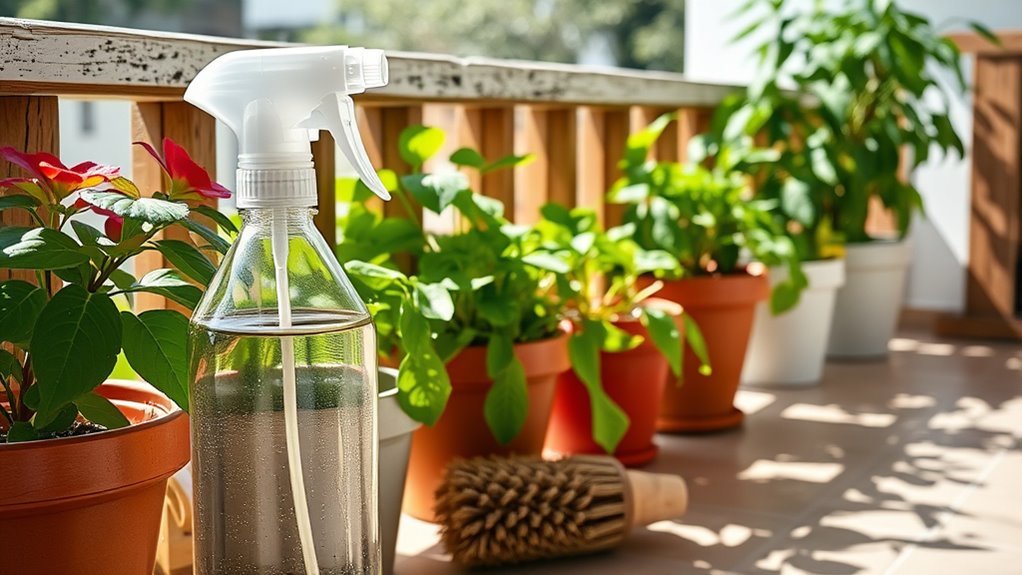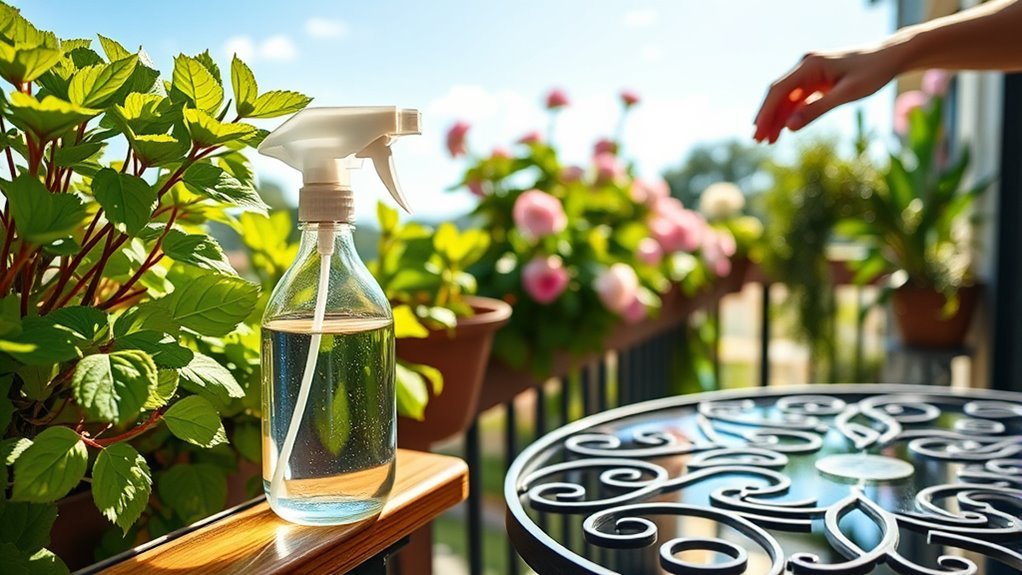Using Essential Oils to Clean Balcony
You can clean your balcony naturally by using essential oils like tea tree, lemon, or eucalyptus, which have antimicrobial and deodorizing properties. Mix 10-15 drops into 500 ml of water or vinegar to create an effective cleaning solution. This method avoids harsh chemicals, promotes a healthier environment, and even freshens the air. Applying these oils properly helps remove mold and mildew while enhancing your balcony’s ambiance. Explore how to optimize these benefits step-by-step for a pristine outdoor space.
Benefits of Essential Oils for Balcony Cleaning

Essential oils offer a natural and effective approach to balcony cleaning, combining antimicrobial properties with pleasant aromas. When you use essential oils, you harness their capacity as a natural disinfectant, eliminating harmful bacteria and fungi without relying on harsh chemicals. This means you can maintain a clean balcony environment that supports your health and well-being while preserving ecological balance. Additionally, essential oils act as an air freshener, neutralizing odors and infusing your outdoor space with invigorating, natural scents. This dual function allows you to enjoy a cleaner balcony with enhanced air quality, promoting a sense of freedom and comfort. By choosing essential oils, you adopt a precise, scientifically supported method that aligns with your desire for effective, eco-friendly cleaning solutions. Using these oils helps reduce exposure to harsh chemicals, supporting both personal well-being and environmental sustainability.
Best Essential Oils for Balcony Maintenance
When selecting oils for balcony maintenance, you’ll want to contemplate those with proven antimicrobial and deodorizing properties. Tea tree oil is a top choice due to its potent antimicrobial effects, effectively reducing bacteria and mold on surfaces. Lemon oil offers strong natural cleaning power with its acidic compounds, cutting through grime while leaving a fresh scent. Eucalyptus oil acts as a natural disinfectant and deodorizer, perfect for maintaining an odor-free environment. Lavender oil, while milder, provides antimicrobial benefits and a calming aroma, enhancing your outdoor space. These essential oils align with your preference for natural cleaning and eco friendly solutions, avoiding harsh chemicals. By integrating these oils, you maintain your balcony’s cleanliness efficiently, supporting a healthier environment and your desire for freedom from synthetic cleaners. Additionally, using these oils contributes to reducing chemical pollution, which supports healthier ecosystems and protects local plant and animal life.
How to Prepare Essential Oil Cleaning Solutions

To prepare effective essential oil cleaning solutions for your balcony, you’ll need to select oils with antimicrobial and deodorizing properties, such as tea tree or lemon. Precise mixing ratios are vital; typically, 10-15 drops of essential oil per 500 ml of water or vinegar provide ideal cleaning potency without causing surface damage. Use proper methods like combining oils with a carrier liquid and shaking well to guarantee even distribution before application.
Selecting Suitable Essential Oils
Although various essential oils offer cleaning benefits, selecting the right ones depends on their antimicrobial properties, scent compatibility, and safety for balcony surfaces. When considering oil selection, focus on essential oils with proven antibacterial and antifungal effects, such as tea tree, eucalyptus, or lemon. Their aromatic properties not only enhance cleanliness but also leave your balcony smelling fresh without overpowering scents. It’s vital to avoid oils that may degrade materials like wood or painted surfaces. Additionally, guarantee the oils you choose are non-toxic and safe for outdoor environments. By prioritizing scientific evidence and understanding each oil’s chemical profile, you empower yourself to create an effective, pleasant, and safe cleaning solution that respects both your space and your desire for freedom in maintaining it.
Mixing Ratios and Methods
Three key factors determine the effectiveness of your essential oil cleaning solution: the concentration of oils, the choice of carrier liquid, and the mixing technique. Ideal dilution ratios typically range from 1% to 5% essential oil in water or a mild carrier like vinegar, balancing potency and safety. You’ll want to measure precisely—usually 6 to 30 drops of oil per 100 ml of carrier—to avoid skin irritation or surface damage. Effective mixing techniques include vigorous shaking or stirring to guarantee uniform distribution of oils within the carrier. Since essential oils are hydrophobic, adding a natural emulsifier, such as liquid castile soap, enhances blending. By controlling dilution ratios and applying proper mixing techniques, you maintain solution stability, maximize antimicrobial action, and protect your balcony surfaces while enjoying freedom from harsh chemicals.
Step-By-Step Guide to Cleaning Your Balcony With Essential Oils
First, you’ll prepare an essential oil cleaning solution by diluting the oil with water and a natural surfactant. Next, apply the mixture evenly across your balcony surfaces, allowing it to break down dirt and grime. Finally, rinse thoroughly with clean water to remove residues and reveal a refreshed space. Be sure to use proper dilution to ensure safety and effectiveness when cleaning with essential oils.
Preparing Essential Oil Solution
To create an effective essential oil cleaning solution for your balcony, you’ll need to measure and combine specific ingredients with accuracy. Start by selecting essential oil types known for antimicrobial and deodorizing properties, such as tea tree, lemon, or eucalyptus oils. Using a clean spray bottle, mix 1 cup of distilled water with 1/4 cup of white vinegar as your base cleaning supplies. Then, add 15-20 drops of your chosen essential oils. This concentration balances potency and safety for outdoor surfaces. Shake the mixture thoroughly to guarantee the oils disperse evenly in the liquid. Store the solution in a cool, dark place to preserve its efficacy. With this precise preparation, your balcony cleaning solution will harness natural compounds, offering a chemical-free, effective way to maintain your outdoor space.
Applying and Rinsing Process
Although the preparation of your essential oil solution is crucial, properly applying and rinsing it guarantees ideal cleaning results on your balcony surfaces. Start by evenly distributing the solution using a spray bottle or microfiber cloth—these applying techniques guarantee thorough coverage without waste. Target all surfaces, including railings and floors, allowing the solution to sit for 5–10 minutes to maximize antimicrobial effects. For rinsing methods, use clean water applied via a hose or bucket to remove residual oils and loosened dirt efficiently. Avoid high-pressure rinsing to prevent damage to delicate materials. Finally, dry the surfaces with a clean cloth or let them air dry completely. By precisely following these steps, you’ll maintain a clean, fresh balcony while embracing eco-friendly freedom in your cleaning routine.
Tips for Removing Mold and Mildew Naturally

Since mold and mildew thrive in damp environments, addressing moisture is crucial when using essential oils to clean your balcony naturally. You can enhance mold prevention and mildew resistance by following these precise steps:
- Mix 10 drops of tea tree oil with 1 cup of water; tea tree oil’s antifungal properties inhibit mold growth effectively.
- Spray the solution onto affected areas and let it sit for 30 minutes to penetrate spores.
- Scrub gently with a brush to remove visible mold and mildew without damaging surfaces.
- Rinse thoroughly and confirm your balcony dries quickly by improving ventilation or using a fan, reducing moisture that fosters fungal recurrence.
- Regular cleaning and maintaining cleanliness help prevent dirt buildup that can trap moisture and promote mold growth.
Enhancing Your Balcony’S Ambiance With Essential Oils
When you incorporate essential oils into your balcony cleaning routine, you can also elevate the space’s ambiance by selecting scents that promote relaxation, focus, or invigoration. Choose essential oils like lavender or chamomile for calming effects, peppermint or eucalyptus to boost concentration, or citrus oils such as orange and lemon for energy. Integrate these fragrances thoughtfully with your existing balcony decor to maintain fragrance harmony, ensuring scents complement rather than overpower. Use diffusers or diluted sprays to disperse aromas evenly, enhancing air quality and sensory experience. This approach not only supports a clean environment but also creates a personalized outdoor retreat that aligns with your desire for freedom and well-being, maximizing the restorative benefits of your balcony space. Additionally, using natural cleaning ingredients like vinegar or baking soda alongside essential oils can further reduce plastic waste while maintaining cleanliness and freshness.
Frequently Asked Questions
Can Essential Oils Damage Outdoor Furniture or Plants?
You should consider essential oil compatibility carefully because some oils can damage outdoor furniture or harm plants. Certain oils, like citrus or eucalyptus, may degrade finishes or cause discoloration. For outdoor furniture care, always test a small, hidden area first and dilute oils properly. When used with caution, essential oils can be safe, but improper use might lead to surface damage or plant stress, so understanding their effects is vital to protect your outdoor space.
Are Essential Oils Safe to Use Around Pets on the Balcony?
Back in the age of musketeers, you’d think pet safety was simpler, but today, it’s more nuanced. Essential oil concentrations matter greatly around your furry friends; high levels can be toxic. You should use diluted oils and guarantee good ventilation on your balcony. Always avoid oils known to harm pets, like tea tree or eucalyptus. By managing concentrations carefully, you’re protecting your pets while enjoying the natural benefits of essential oils safely.
How Long Do Essential Oil Scents Typically Last Outdoors?
You’ll find that essential oil scent longevity outdoors varies widely due to outdoor factors like wind, temperature, humidity, and sunlight exposure. Typically, the aroma lasts from a few minutes to several hours, but it dissipates faster in windy or hot conditions. To maximize scent longevity, apply oils in sheltered spots and consider blending with carrier oils. Understanding these factors helps you enjoy the natural fragrance without it fading too quickly.
Can Essential Oils Prevent Insect Infestations on Balconies?
Imagine a shield of fragrant mist protecting your space. You’ll find that essential oils like citronella, eucalyptus, and peppermint have insect repellent properties scientifically proven to act as natural pest deterrents. While they can reduce insect presence on your balcony, they don’t guarantee complete prevention. Regular application and combining oils with other pest control methods will enhance their effectiveness, allowing you to enjoy your outdoor freedom with fewer unwanted visitors.
What Are the Environmental Impacts of Using Essential Oils Outside?
When you use essential oils outside, consider sourcing sustainability to minimize environmental harm. Some oils come from overharvested plants, impacting ecosystems. Applying them outdoors can affect local air quality; volatile compounds may contribute to pollution or affect sensitive species. To maintain ecological balance, choose sustainably sourced oils and apply them sparingly. This way, you protect your freedom to enjoy nature while reducing negative environmental impacts responsibly.






